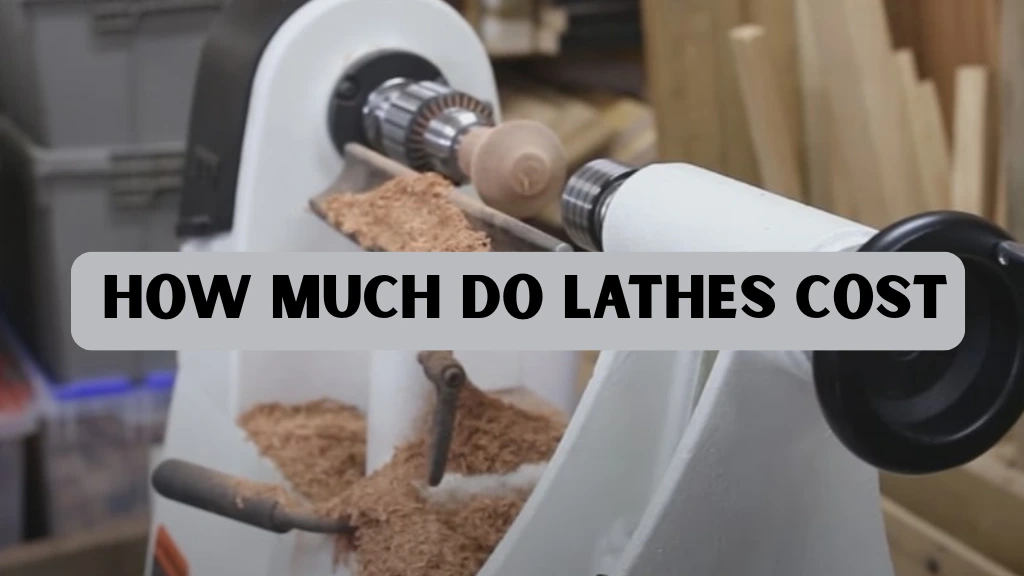Lathes have been at the heart of manufacturing for centuries, playing a critical role in shaping wood, metal, and other materials into precise and functional components. From small workshops to large-scale industrial plants, these machines remain indispensable. Yet, one of the most common questions for both beginners and professionals entering this field is simple: how much do lathes cost? The answer depends on multiple factors, including size, type, materials, technology, and the intended application.
Understanding the full scope of lathe pricing requires looking beyond the upfront price tag. Buyers must also consider additional expenses such as tooling, accessories, maintenance, and power consumption. In this detailed guide, we will examine different categories of lathes, explore the factors influencing their price, provide real-world examples, and help you decide which option best suits your needs in 2025.
Factors That Influence Lathe Prices
The cost of a lathe varies widely because no two machines are exactly alike. Build quality, automation level, brand reputation, and precision standards all play defining roles in answering the common question of how much do lathes cost. For instance, a small bench-top wood lathe may be affordable for hobbyists, while a fully automated CNC lathe designed for aerospace production could cost as much as a luxury car.
Size is another major factor influencing price. Compact lathes with small swing diameters and limited bed lengths generally cost less than full-sized models capable of handling heavier materials. The type of lathe also impacts investment: traditional manual lathes remain more budget-friendly, whereas advanced CNC lathes justify their higher prices by offering digital control, complex part programming, and high-volume production capacity.
Brand reputation further affects overall cost. Trusted names such as Haas, Grizzly, or Jet often command premium prices due to their reliability, availability of parts, and strong after-sales support. Meanwhile, lesser-known brands or lower-cost imports may reduce upfront expenses but can create challenges with servicing and sourcing spare parts over time, making long-term ownership more expensive.
Different Types of Lathes and Their Costs
Lathes fall into distinct categories based on their purpose and sophistication, each carrying a unique price range tied to design and capabilities. Wood lathes remain the most accessible, often used by carpenters, furniture makers, and hobbyists. Entry-level models may cost under $500, while professional-grade machines with advanced controls range between $2,000 and $5,000. Experienced woodworkers often highlight the importance of durability and precision, which justifies the higher investment for long-term use.
Metal lathes, by contrast, are engineered for strength and heavy-duty applications. Smaller bench-top machines typically range from $1,000 to $2,000, while professional workshop models cost $5,000 to $15,000. At the industrial level, prices exceed $50,000, particularly for continuous production or specialized machining. Industry experts recommend evaluating spindle power, bed length, and accuracy before purchasing, as these factors greatly impact reliability in demanding environments.
CNC lathes represent the most advanced and expensive category, designed for precision and automation in high-volume manufacturing. Basic CNC models start near $20,000, while multi-axis machines with robotic integration can surpass $100,000. Their ability to produce complex shapes consistently makes them essential in fields such as aerospace and automotive. Professionals often stress that while the upfront cost is significant, CNC lathes provide unmatched efficiency, scalability, and long-term value for serious production needs.
How Much Do Lathes Cost
The most common question buyers ask is how much do lathes cost, and the answer depends on machine type, features, and intended use. Wood lathes remain the most affordable, with hobbyist-level models priced between $300 and $1,500. Professional woodworking shops often invest in machines closer to $5,000 or more, especially when stronger motors and digital speed controls are required. Experienced woodworkers often confirm that these upgrades save time and improve output quality, making them worthwhile long-term investments.
Metal lathes occupy a higher price tier because of their industrial applications and durability requirements. Entry-level models generally start around $1,000, while professional machines range from $5,000 to $20,000 depending on precision and size. At the heavy-duty industrial level, prices can reach $80,000 or more, particularly when continuous operation is expected. Manufacturers with established reputations such as Haas or Jet consistently receive strong customer reviews, reinforcing their reliability and value in real-world settings.
CNC lathes represent the most advanced and costly category, starting between $20,000 and $40,000 for smaller two-axis models. Businesses that require live tooling, robotic integration, or multi-axis capabilities may spend well over $150,000. While the upfront cost is significant, CNC machines are often viewed as strategic investments because they deliver precision, efficiency, and scalability. In industries like aerospace and automotive, where even small errors can lead to production delays or safety risks, professionals trust these machines to meet the highest standards of performance.
Additional Costs Beyond the Machine
The cost of owning a lathe does not stop at the initial purchase price, and buyers must plan for several additional expenses. Tooling is one of the largest factors since cutting tools, chucks, steady rests, and digital readouts are often necessary. For CNC models, licensed software and programming utilities are also required, which can quickly add up. In many cases, these extras represent 10 to 30 percent of the total investment.
Maintenance is another area where long-term costs must be considered carefully. Because lathes rely on moving parts under heavy stress, they require regular lubrication, bearing replacements, and motor servicing. Many manufacturers strongly recommend annual service contracts for CNC lathes to avoid costly downtime. While such contracts may run into thousands of dollars, they protect the machine’s reliability and extend its useful life.
Installation and energy consumption also make a noticeable difference to overall expenses. Small hobby lathes can often be set up independently, but larger industrial models may need professional installation, reinforced foundations, and electrical upgrades. These preparations can add hundreds or even thousands of dollars. Once operational, power use becomes an ongoing expense, particularly in workshops where CNC lathes run continuously.
Real-World Examples of Lathe Pricing
Real-world examples demonstrate how lathe pricing aligns with user needs and production goals. Take Daniel, a woodworking hobbyist, who invested about $600 in a small bench-top lathe. While the machine lacked the power for larger projects, it served as a reliable starting point for crafting bowls and spindles. Stories like his reflect how affordable options can still deliver meaningful value for beginners exploring the craft and asking themselves how much do lathes cost when starting out.
A mid-sized furniture workshop in Ohio provides another perspective. By spending $3,500 on a professional-grade wood lathe with digital controls and a durable motor, the workshop scaled production without compromising precision. Their investment paid off as they consistently met client demand while reducing waste and rework, illustrating how higher-quality machines can directly support business growth.
On the industrial side, an automotive parts supplier in Michigan allocated nearly $90,000 to acquire a CNC lathe with multi-axis capabilities. Despite the steep upfront cost, the machine quickly justified its price by delivering thousands of identical, high-precision parts at record speed. This case underscores how large-scale manufacturers often view advanced lathes as long-term assets that drive efficiency, profitability, and competitiveness in demanding industries.
Factors to Consider Before Buying a Lathe
When choosing a lathe, buyers should carefully match the machine to their specific needs, workspace, and long-term goals. Hobbyists, for example, often prioritize affordability and compact size, since many set up their lathes in garages or small workshops. A well-chosen entry-level model can provide years of reliable use without requiring a large upfront investment.
For professionals running woodworking or metalworking businesses, the evaluation process requires greater attention to accuracy, durability, and technical support. Experienced machinists know that even minor inconsistencies in performance can cause costly delays or compromise customer satisfaction. Investing in a well-built machine from a reputable manufacturer, backed by strong service records and positive customer reviews, helps ensure smooth operations and dependable results.
At the industrial level, decision-making revolves around automation, programming flexibility, and production capacity. Manufacturers in sectors like aerospace and automotive often view high-quality CNC lathes as long-term investments rather than expenses. Although upfront costs may be substantial, these machines offer efficiency, precision, and scalability that more than justify the price. Partnering with trusted brands that provide accessible spare parts, regular maintenance programs, and proven track records builds confidence that the machine will deliver value for years to come.
Conclusion
So, how much do lathes cost in 2025? The answer depends heavily on the type, size, and intended application. Wood lathes remain affordable for hobbyists and small shops, while metal and CNC lathes scale dramatically in price for professional and industrial use. Beyond the machine itself, buyers must also consider tooling, maintenance, and installation costs.
Ultimately, the key is to match the investment to your goals. A hobbyist seeking a creative outlet may not need more than a few hundred dollars in equipment. A growing business, however, may find that spending tens of thousands on a high-precision CNC machine is the most cost-effective way to expand production.
By carefully assessing your needs, budget, and long-term vision, you can make an informed decision that balances cost with value. Whether you are a hobbyist turning your first wooden bowl or an industrial manufacturer producing thousands of metal components, the right lathe remains one of the most valuable investments in machining today.
FAQs
What is the average cost of a basic lathe for beginners?
A basic wood lathe for beginners usually costs between $300 and $800. These machines are suitable for small projects like bowls, pens, and decorative items.
Are CNC lathes worth the higher cost?
Yes, CNC lathes are worth the investment for businesses that require precision and high-volume production. They save time, reduce errors, and improve efficiency, making them cost-effective in the long run.
Do used lathes cost significantly less?
Used lathes are typically more affordable, sometimes costing half or less of a new machine. However, buyers must carefully inspect condition, wear, and availability of parts before purchasing.
How much should I budget for accessories and tooling?
Accessories and tooling can add 10 to 30 percent of the lathe’s cost. Items such as chucks, cutting tools, and software for CNC lathes are essential for proper operation.
Is financing available for industrial lathes?
Yes, many equipment suppliers and financial institutions offer financing options. This allows businesses to spread the cost over time, making large investments more manageable.




